Men, women and children suffering from harsh physical conditions and legal shortcomings at Pacific Island asylum centres: UNHCR reports
This is a summary of what was said by UNHCR spokesperson Adrian Edwards – to whom quoted text may be attributed – at today's press briefing at the Palais des Nations in Geneva.
In two reports released today, UNHCR finds that asylum-seekers transferred from Australia to processing centres at Nauru and Manus Island in Papua New Guinea (PNG) are living in arbitrary detention in conditions that do not meet international standards of treatment.
UNHCR understands Australia's determination to respond robustly to the challenges of people smuggling and to dissuade people from undertaking dangerous irregular travel by sea. However we believe those responses must not neglect the compelling protection needs, safety and dignity of the individuals affected.
These reports are also in the context of what UNHCR has observed to be a sharp deterioration during 2013 in the overall quality of protection and support available to asylum-seekers and refugees who come to Australia by boat. It remains the case that when policies and practices are based primarily on deterrence, they can have harmful and, at times, punishing consequences for people affected, particularly families and children.
The reports identify troubling shortcomings at both centres, and urge all three States involved to consider the findings and recommendations and act upon them.
In both Nauru and PNG the current policies, operational approaches and harsh physical conditions at the centres not only do not meet international standards - they also have a profound impact on the men, women and children housed there.
UNHCR is concerned that they constitute mandatory detention which is not compatible with international law. We are also worried that they do not provide a fair and efficient system for assessing refugee claims, do not provide safe and humane conditions of treatment in detention, and do not provide for adequate and timely solutions for recognized refugees.
With the Nauru report, it acknowledges some positive developments since our last visit in March. However, there have also been significant setbacks in refugee processing, and a deterioration in reception conditions. Despite a processing system being in place under Nauru law, only one decision has been handed down in the 14 months since the centre reopened.
No decisions at all have been finalized at the centre in PNG, and while some improvements were observed since UNHCR's last inspection in June, the physical conditions within detention, together with the slowness of processing and the lack of clarity regarding safe and sustainable solutions for refugees were likely, together, to have a serious and negative effect on the health and welfare of people transferred from Australia.
At both centres, the psycho-social well-being of vulnerable people - including survivors of torture and trauma and unaccompanied children - is an issue of concern. UNHCR also called on all three States not to transfer children, particularly those who are unaccompanied, unless and until there has been a marked improvement in conditions in both centres.
UNHCR is particularly concerned by the impact of policies that will prevent recognized refugees from finding safe, dignified and sustainable solutions in the medium to long term. The prospect for refugees in PNG finding permanent protection there presents formidable challenges, and it is clear that Nauru will offer only very limited opportunities for refugees even in the shorter term.
UNHCR believes the arrangements at Nauru and PNG would benefit from a much clearer articulation of the policy and operational framework that would set out how, when and where refugees will be able to secure protection and exercise the rights required under the 1951 Refugee Convention.
The full reports, including recommendations, are available at: www.unhcr.org.au
For more information on this topic, please contact:
- In Canberra (Regional): Ben Farrell on mobile +61 407 971 686
- In Geneva: Adrian Edwards on mobile +41 79 557 91 20
- Babar Baloch on mobile +41 79 557 9106
Related news and stories
Global photo project shows power of football during displacement
The Kenyan powerhouse improving women's lives in Australia
UN refugee chief welcomes cities' support for refugees
UNHCR appeals to Australia to act and save lives at immediate risk
UNHCR urges Australia to end separation of refugee families
'We must believe we can make a difference and we can do things better' - Andrew Harper
-
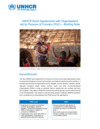
UNHCR Grant agreements with organizations led by displaced and stateless persons - Briefing Note
10 Dec 2021 The new UNHCR Grant Agreement for organizations seeks to ensure that displaced and host communities are treated as equal and active partners. It provides grant funding to organizations led by displaced and stateless persons in order to empower them to realize their own projects and build their capacity. It also allows UNHCR to work directly with the people it serves without having to use intermediaries. -
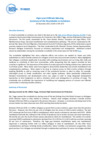
Summary of Roundtable 5: Solutions
10 Dec 2021 This document summarizes the roundtable on solutions, the fifth of a series of five preparatory roundtables to be held in the lead-up to the High-Level Officials Meeting. -

Deadly clashes over scarce resources in Cameroon force 30,000 to flee to Chad
10 Dec 2021 -
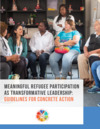
Meaningful Refugee Participation as Transformative Leadership: Guidelines for Concrete Action
10 Dec 2021 This Guidance was drafted by the Global Refugee-led Network in advance of the Global Refugee Forum in 2019. It identifies challenges and gaps to implement refugee participation, while providing guidance on how stakeholders can ensure participation is meaningful. -

Refugee-led innovations during COVID-19
10 Dec 2021 UNHCR dedicated its 2020 NGO Innovation Award to Refugee-Led Organizations (RLO) that developed creative responses to support their communities during the COVID-19 pandemic. Through this Award, UNHCR wishes to showcase the leadership and crucial contributions of these RLOs in supporting their communities, and thus, demonstrate the need to expand and strengthen our partnerships with them. This publication features the work of 20 organizations, including the 7 winners. -
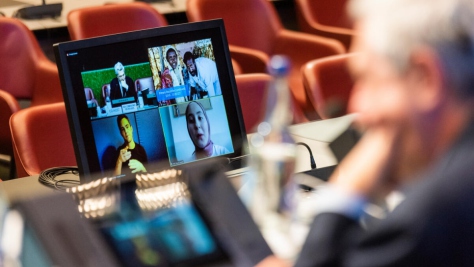
Document library
-
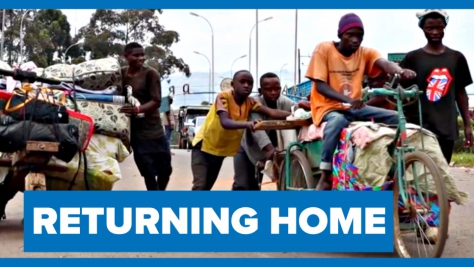
Congolese refugees torn between returning home or remaining in exile
9 Dec 2021 -

Linked and side events for GCR stakeholder groups and initiatives
9 Dec 2021 Timetable for the linked events and side events, which are being held virtually on 13 December for GCR 2021 stakeholder groups and initiatives. -

Amid rising needs, partners seek US$1.79bn for Venezuelan refugees and migrants
9 Dec 2021 Joint UNHCR/IOM Press release
